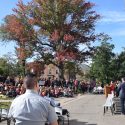“Acadia University is located in Mi’kma’ki, the ancestral territory of the Mi’kmaq nation.”
This oft-quoted statement has become the norm on course syllabi and department emails, but its significance is often glossed over and not fully understood by many members of the Acadia community.
It is known as a territorial acknowledgement and it is given in recognition that the land upon which we study and gather is part of the traditional lands of the Mi’kmaq peoples. It is an important cultural protocol for many Indigenous peoples, nations and cultures and it serves to demonstrate our respect for the traditional custodians of these lands.
Indigenous peoples had lived on these lands for thousands of years before colonial settlers first arrived in the 14th and 15th centuries. They established successful communities and governing structures that allowed their peoples to flourish in pre-contact North America. However, over the successive centuries, both French and British administrations had enacted policies and laws that disadvantaged and often harmed Indigenous peoples and their traditional ways of life.
The creation of residential schools in the late 19th century served as the culmination of the discriminatory practices against Indigenous peoples. Indeed in 1920, Duncan Campbell Scott, Deputy Superintendent General of the Department of Indian Affairs, stated “I want to get rid of the Indian problem … Our objective is to continue until there is not an Indian that has not been absorbed into the body politic, and there is no Indian question, and no Indian Department”. This form of outward racism continued throughout the 20th century until the last residential school (Saskatchewan’s Gordon Indian Residential School) was closed in 1996. Residential schools were places of immense sadness and despair as children were frequently abused, physically, emotionally, and sexually by their superiors. They were also prohibited from speaking their language, celebrating their traditional customs and returning to their home communities and parents.
The extensive history of oppression through residential schools, among other things, is a dark stain on the Canadian consciousness. However, it has resulted in renewed movements to educate the Canadian populace on these dark corners of our history and to unite in a spirit of truth and reconciliation as we seek to move forward as a country. This positive message gives us hope that Canadians can come together to recognize our past failures and chart a better way forward.
Each year, October is designated as Mi’kmaq History Month, and it provides an opportunity for the Acadia community to learn more about our collective history and the important contributions that Indigenous individuals and communities have made to our country. Groups including the Indigenous Students’ Society of Acadia (ISSA) and several academic departments often hold events that aim to teach and celebrate Indigenous culture and perspectives.
This year, former Chief Adviser to the Truth and Reconciliation Commission Tim O’Loan visited Acadia’s campus to speak about the history of residential schools and the path toward reconciliation, and John Hannam, City Clerk of the City of Thunder Bay (Ontario), visited the local area to screen the “Walk a Mile” film project and lead community members through a discussion on the film.
Oliver Jacob is a third year History and Politics student and News Editor of The Athenaeum
